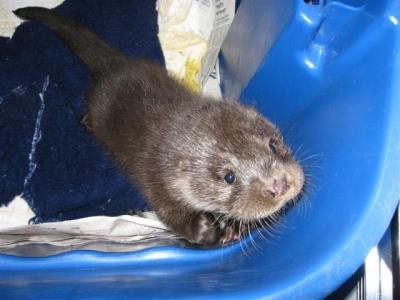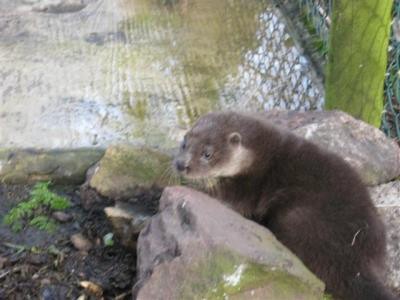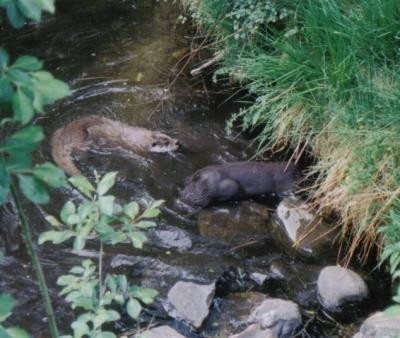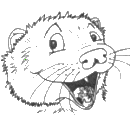Mustelid Musings 2: Squirt
by June McNicholas
Well, when I wrote about 'Wispa', the weasel, in an earlier newsletter, I didn't get shouts of horror that I'd written about a mustelid other than a ferret so I'm daring to write about another mustelid that enhanced my life during my years working with the Highland Wildlife Hospital.
 'Squirt' was a tiny otter cub, around 4 weeks old, taken into the Wildlife Hospital after having been found wandering, bleating in distress, near to a road by a sea-loch in the North West Highlands of Scotland. Her eyes were not yet open and she desperately needed help. What had happened to her mother or any other siblings remains a mystery, but it had been a time of incredibly bad weather so it is possible that her holt had been flooded out, leaving her stranded.
'Squirt' was a tiny otter cub, around 4 weeks old, taken into the Wildlife Hospital after having been found wandering, bleating in distress, near to a road by a sea-loch in the North West Highlands of Scotland. Her eyes were not yet open and she desperately needed help. What had happened to her mother or any other siblings remains a mystery, but it had been a time of incredibly bad weather so it is possible that her holt had been flooded out, leaving her stranded.
I'd like to say that Squirt got her name because she was such a pathetic little squirt when she was found. However, her name really derived from what her rear end was doing! She clearly had problems! Luckily, the Highland Wildlife Hospital were well experienced with feeding baby otters and her problems soon abated with the right milk formula.
Squirt remained at the Wildlife Hospital for several weeks during which time she grew rapidly and, like all young mustelids, was very playful. The only problem with baby otters is that they grow large! At 10 weeks she was at least treble the size of a good sized ferret hob. However, her play behaviours were similar and when she was transferred to our croft for rehabilitation we delighted in her antics. She would rush and grab our hands, running away, chuckling in delight. She loved anything she could grab and stash, whether this was paper, material, food or anything else grabbable. (You've got ferrets, you know what that means!) When she was tired of playing she would curl up on my lap or join my Beauceron dog in his basket.
For the first few months Squirt lived in the house and 'her' pool in the garden, getting used to us and the various other animal babies that were currently with us. I am probably one of the few people privileged to see a baby otter, a fox cub and a badger cub engage in friendly play, not to mention the antics of a baby goat who just wanted to jump on anything that moved.
 However, we were a rehabilitation centre and that meant that Squirt needed to learn to be a wild otter. At 12 weeks she was eating fish and gradually learning about crunching crabs and other shellfish that could be found on the shore of our loch. The big thing was teaching her to swim. It may sound strange but baby otters are afraid of water! It is common for mother otters to forcefully grab their cubs and drag them into the water where-upon the cubs cry in distress and make a rapid retreat to dry land. Squirt had no mother to teach her so it fell to me to teach her about swimming. Luckily we had a burn across our land which had deep areas. Squirt would follow me, trustingly, down the croft. Then I would have to launch her into the burn. Like wild babies she would complain loudly and scramble for land, glaring at me for having subjected her to the ordeal, but gradually she accepted that water should be a part of her life. We also had a pool on the croft that we could regularly refresh from a hosepipe. Squirt loved it, and that became the 'official' reason for her name as she loved to chase the squirting hose as it filled the pool. It also helped her learn to dive. Baby otters, once used to swimming, have to learn to dive to find food. The only problem is that their fluffy baby coats are not suited to diving. Squirt did her best but her fluffy bottom meant that every time she put her head down to dive, she bobbed up like a cork, bottom first. The look on her face was wonderful. It was a kind of 'I was going down there... so how did I end up here?' type of expression, but eventually her diving skills improved.
However, we were a rehabilitation centre and that meant that Squirt needed to learn to be a wild otter. At 12 weeks she was eating fish and gradually learning about crunching crabs and other shellfish that could be found on the shore of our loch. The big thing was teaching her to swim. It may sound strange but baby otters are afraid of water! It is common for mother otters to forcefully grab their cubs and drag them into the water where-upon the cubs cry in distress and make a rapid retreat to dry land. Squirt had no mother to teach her so it fell to me to teach her about swimming. Luckily we had a burn across our land which had deep areas. Squirt would follow me, trustingly, down the croft. Then I would have to launch her into the burn. Like wild babies she would complain loudly and scramble for land, glaring at me for having subjected her to the ordeal, but gradually she accepted that water should be a part of her life. We also had a pool on the croft that we could regularly refresh from a hosepipe. Squirt loved it, and that became the 'official' reason for her name as she loved to chase the squirting hose as it filled the pool. It also helped her learn to dive. Baby otters, once used to swimming, have to learn to dive to find food. The only problem is that their fluffy baby coats are not suited to diving. Squirt did her best but her fluffy bottom meant that every time she put her head down to dive, she bobbed up like a cork, bottom first. The look on her face was wonderful. It was a kind of 'I was going down there... so how did I end up here?' type of expression, but eventually her diving skills improved.
Once the swimming and diving lessons were out of the way, and Squirt was used to the fish and shellfish that could be found around our coast, we had to consider the most heart-breaking time of any rehabilitation programme. Squirt needed to learn to be suspicious, even afraid, of people if she was to succeed in life as a wild otter. Up to then she had been a much loved presence in the house, relying on us and the other animals for companionship and instruction. It was hard, but now she had to go it alone if she was to become a wild otter. She had to leave us.
A pen was built on our bottom field, close to the shore and well away from any human habitation. We went down twice a day to feed her but deliberately avoided any interaction with her. We even made loud noises that could alarm her, took our barking sheepdog down, and anything else we could think of that would detach her from humans. Squirt was only 8 months old.
However, she could feed herself, although we continued with support feeding. The burn led to the shore and we gradually opened the way for her to go down and forage for herself. We had regular updates from a local fisherman who assured us that she was doing well. By the time Squirt was a year old she was mostly feeding herself although she returned, voluntarily, to her pen each day.
 Another year passed. Squirt was a mature female but she still had not left home. Her pen was entirely open for her to come and go as she pleased, but still she came home every day after fishing in the loch. We no longer gave support feeding - she didn't need it. Then, one day, I went down to her pen one evening to be greeted by not one but two otters. Squirt had a boyfriend! She had brought him home without even asking my approval!
Another year passed. Squirt was a mature female but she still had not left home. Her pen was entirely open for her to come and go as she pleased, but still she came home every day after fishing in the loch. We no longer gave support feeding - she didn't need it. Then, one day, I went down to her pen one evening to be greeted by not one but two otters. Squirt had a boyfriend! She had brought him home without even asking my approval!
The following spring Squirt gave birth to THREE cubs. Luckily the weather was kind and the loch teemed with fish and shell-fish. The family thrived. Squirt still did not leave home. Somehow, her territory, claimed as an adult female, retained our bottom field and its burn so we had regular sightings of the family as she brought them 'home'. We delighted in watching her teach her cubs how to fish and feed in ways that she had never learnt from a real mother. We had got her teaching right after all.
Two years later, Squirt had twins. Again as a totally wild otter. The weather was very rough and I think it was hard-going for her to rear them, but she managed. I have no idea what happened to these, or the earlier cubs, only that they survived to maturity.
Squirt has now raised her third litter in the wild. She recognises me when I appear on 'her' shore but there is no attempt on her part or mine to interact. That is not what rehabilitation is about. She is wild and free, as she was born to be. That is enough.
Squirt was my first otter cub and, thanks to her, I have raised four other otter cubs. All have been successfully rehabilitated. I learned so much from her. Seven years on, she is still in the loch, although not breeding. But then, she is an old lady now by otter standards. I have left 'her' pen on the bottom field and there are signs that she still visits for an occasional lie-down in the afternoon sun after fishing on a rising tide.
I couldn't ask for more.
